When installing a tubular deadlock first inspect the door and frame are suitable for this type of lock. Tubular deadlocks are usually fitted to wooden frame doors but can easily be fitted to a steel frame door or aluminium frame door. If the door frame is made of wood and has a glass panel next to it the deadlock bolt might stick through the frame or might even hit the glass. Be aware of any issues that your particular door and frame might have.

How to fit a Deadlock
by John_Magee
Fitting a deadlock is not hard. You just need the right tools and a sharp chisel. Here's a bit of an explanation on the installation of a tubular deadlock.
Mark the door and get ready to drill the holes
Hollow core doors have a wooden insert inside the door where the locks must be fitted. Knocking on a hollow core door and listening for the change in sound will tell you where the wooden insert ends. Only fit the lock where the insert is as there is nothing solid anywhere else in these types of doors.
The deadlock should be fitted at lease 200mm away from other locks on the door. If it is too close the door can split and crack. Most locks come with a paper template for fitting. Fold the template and place the edge line on the door edge. Use a sharp pointed tool or a centre punch to mark the 2 holes. One will be on the edge of the door in the centre and the other will be at either 60mm or 70mm depending on the deadlock bolt size. One marked, make a deeper mark with a centre punch.
Use the template to mark the door
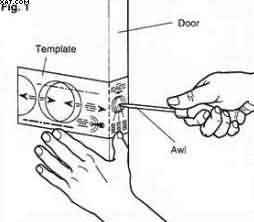 Marking the Door |
Get the drill ready!
With the 54mm holesaw drill the large hole which will be set back either 60mm or 70mm from the door edge. Do not drill all the way through the door with the holesaw. Drill halfway from one side, then halfway from the other side. Drilling straight through will chip the door as the holesaw as it breaks through.
Now drill the 1 inch hole into the edge of the door. Make sure the hole is drilled straight and try to control the bit so as not to let it wonder and go crooked. Go slow as the tool breaks through into the large hole as the door can split if it catches.
Chisel and Hammer Time
Place the deadlock bolt into the hole and mark around the outside of the bolt face with a scribe or pen. Remove the bolt and with a chisel take out the timber to let the bolt sit flush with the door. When chiseling out the deadbolt plate hole, chisel gently around the outline of the plate. At the top and bottom of the plate hole use the chisel and cut the timber quite hard. Try to only chisel with the grain of the timber to avoid splitting the door.
Get it mounted correctly
Insert the deadlock bolt into the door and screw it in place. If the deadlock came with spacer rings these may or may not be needed depending on the thickness of the door. A thin door will require the spacers to pack it out. This will ensure the deadlock does not bind when the key is turned. A thick door may not engage the bolt with the cylinder tailpiece if the spacers are used.
Assemble the deadlock cylinders with the tailpieces in the correct position and screw to the door. Some deadlocks have concealed fixing that requires an allen-key to tighten. Some deadlocks come with one way screws to prevent the deadlock from being removed from the door.
Test that the deadlock works correctly and fix any problems. Especially look for smooth operation and that the bolt extends fully and is deadlocked. When the bolt is extended it should not be able to be pushed back in without turning the key.
Install the deadlock
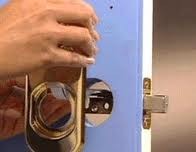 Mount the deadlock |
Fit the Strike.
Close the door to its normal closing position and push the bolt out by turning the key. Using a thin pointy tool, such as a pointy needle file, scribe around the edges of the bolt. Check that a clear outline of the bolt is scribed on the door frame. Another way to get an imprint of the bolt is to smear lipstick on the end of the bolt and throw it into position, leaving a lipstick imprint on the frame.
If the frame is wooden use a 24mm spadebit and drill a 25mm(or the depth required for your bolt) hole. The hole should be drilled in the centre of the scribed bolt hole. Check the hole is drilled deep enough by locking the deadlock and with a thin scribe make a line on the bolt. Open the door and lock the deadlock to check the line you scribed is in the same place.
Check the deadlock closes and there is slight play in the door when it is closed. Mark the outline of the strike plate with a pen or scribe. Chisel out the timber to make the strike plate flush with the frame. Once again only chisel with the grain to avoid splitting the timber. Screw the strike plate to the frame and check for proper operation.
Fit the Strike Plate
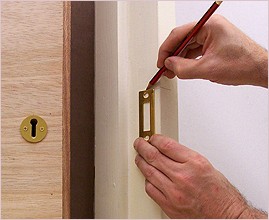 Strike Plate Installation |
Wood or Steel Frame?
If the door frame is steel it is easiest to drill a hole in the frame and not use the strike plate. A Carbide tipped holesaw is best for making this hole. There will probably also be concrete behind the steel so a tungsten masonry bit is needed to finish the job. It is possible to fit a strike to a steel frame door. A special steel frame strike is needed and it has to be precisely cut into the frame. Ask a locksmith for more detailed information on installing a steel frame deadlock strike.
Wood or Steel door frame
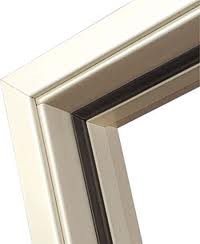 Door Frame made of Steel |
You might also like
Fire Extinguishers - A Great House-warming GiftFire extinguishers come in a variety of sizes, they go with every décor and ...
Home Burglar Alarm SystemsSecuring your home from burglars is something that should never be neglected....
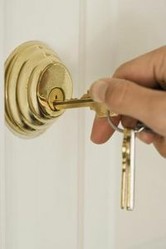

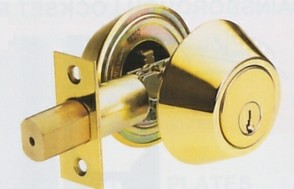
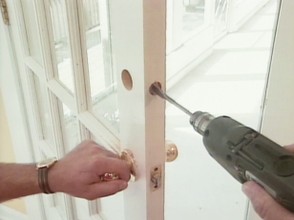
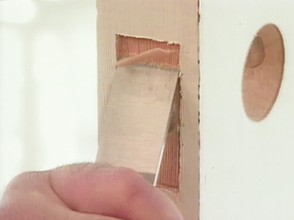

 Aquaponicson 09/24/2013
Aquaponicson 09/24/2013
 How secure are Swipe Cardson 03/13/2013
How secure are Swipe Cardson 03/13/2013
 Electric Chainsaws - Any Good?on 03/13/2013
Electric Chainsaws - Any Good?on 03/13/2013
 My invoicing experienceson 02/27/2013
My invoicing experienceson 02/27/2013


Comments
Thank you , I want to add deadlocks to all of my appropriate doors. What a piece of mind sound locks gives. :)K
good information. Thanks for the help!